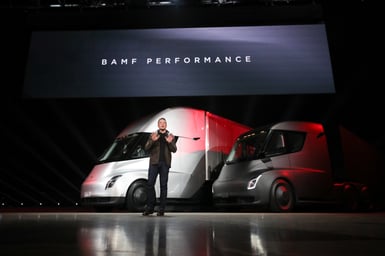Tesla: Electrifying the Commercial Trucking World
Tesla, the EV maker founded in 2003 and known for its luxury all-electric passenger vehicles, has growing street cred and a swelling customer base. With ever-increasing demand – by industry, regulators and the public – to reduce vehicle emissions (not to mention improve overall economic and environmental efficiencies), it should come as no surprise that electric vehicle technology is coming to the commercial vehicle sector, too. Enter: The Tesla Semi
About The Tesla Semi Truck
Marketed as the “safest, most comfortable truck ever,” the Semi is set to start production in 2019 – in fact, a couple of test models are plying U.S. highways already. Touted also as the fastest transport truck ever, this futuristic-looking vehicle boasts several impressive statistics.
With an estimated range of 800km (500 miles) per charge, the Tesla would be practical on all but the longest long-haul trips (industry estimates say 85% of transport truck trips are shorter than 250 miles).
New-Age Looks & Performance
It certainly is a unique-looking machine: The driver's seat is positioned in the centre of the cab to offer improved visibility, the cab’s low centre of gravity and smooth profile promises an ultra-low drag coefficient and the oversized glass windscreen wrapping the front of the cab is virtually unbreakable.
Devoted petrolheads will know that its acceleration of 0-60 MPH in five seconds (with no load – 20 seconds towing a full 80,000-pound load) would put most of our practical family vehicles to shame.
Tesla Semi Cost
The upfront cost for a Tesla Semi is expected to be between US$150,000 and US$200,000. The company even guarantees the truck won’t break down for one million miles. In addition, it will require minimal ongoing maintenance due to fewer parts that need regular upkeep and replacement (just think: no oil filters, fan belts, transmission, fuel lines...the list goes on).
 But aside from the impressive visuals, the bragging rights and superlative claims about its performance and safety, the vehicle just makes a lot of sense. If it performs as promised, at the stated price-point (not astonishingly higher than a standard diesel truck), and is operated in an environment equipped with the requisite charging infrastructure, it's sure to be a game-changer.
But aside from the impressive visuals, the bragging rights and superlative claims about its performance and safety, the vehicle just makes a lot of sense. If it performs as promised, at the stated price-point (not astonishingly higher than a standard diesel truck), and is operated in an environment equipped with the requisite charging infrastructure, it's sure to be a game-changer.Tesla Semi: The Takers
There are several already... even though the Semi has yet to start rolling off production lines.
- Walmart has ordered 40 over the past year, with a goal of phasing out diesel engines for its truck fleet by 2028.
- FedEx ordered 20 of the trucks in 2018.
- U.S. grocery chain Albertsons ordered 10 this fall for its Southern California fleet, to service 2,300 stores across the U.S.
- Anheuser-Busch, UPS, Pepsi, J.B. Hunt Transport, and DHL have all put in orders as well, with others sure to sign on after production begins.
Tesla isn’t the only one
Almost every major truck brand is working on an electric truck – or one that combines a hydrogen fuel cell with an electric power train… or both. For example, Tesla's rival Nikola Motor Company plans to begin production of a new hydrogen-electric truck for European markets – the Nikola Tre – in the next three to four years.
Daimler trucks is jumping in, too, with the eCascadia, an all-electric version of their flagship truck, the Cascadia, that's expected to begin production in 2021. The company has already delivered a handful of units to a few early customers.
What’s next?
Other obvious candidates for electrification include the garbage truck and delivery truck fleets. These vehicles' start-stop operation is a perfect fit with vehicles that have no idling emissions and can regenerate battery power through braking.
Ultimately, electric vehicles like the Tesla Semi could significantly reduce costs for freight companies, consumers and everyone else on down the supply chain.
Time will tell if the latest electric trend is all it’s cracked up to be. In the meantime, it’s certainly an interesting story to watch unfold. Feel free to reach out to our industry specialists – always on the lookout for changes that could impact the logistics industry – to discuss any matters that might be impacting your business.
Information provided by: Freight Dept. - Cole International

